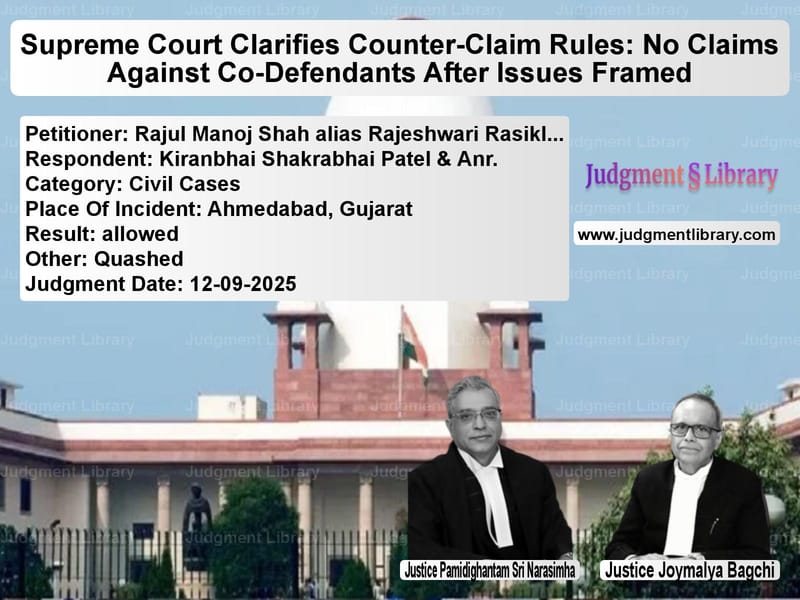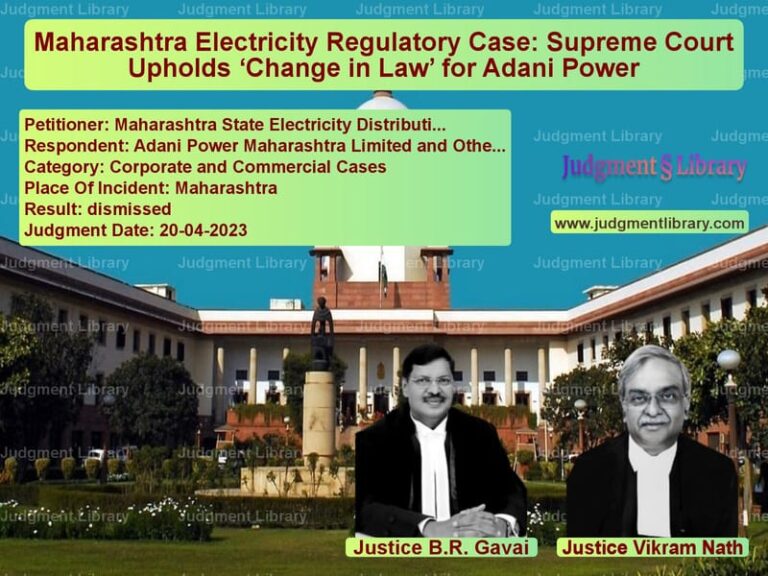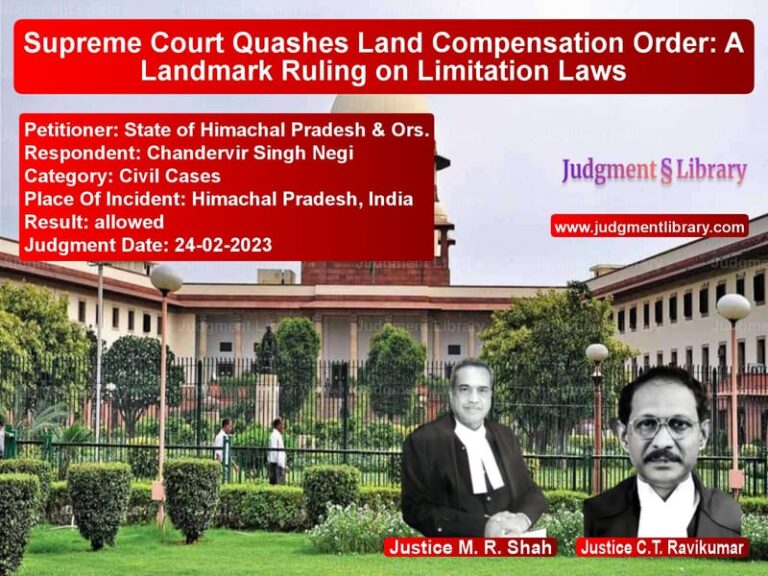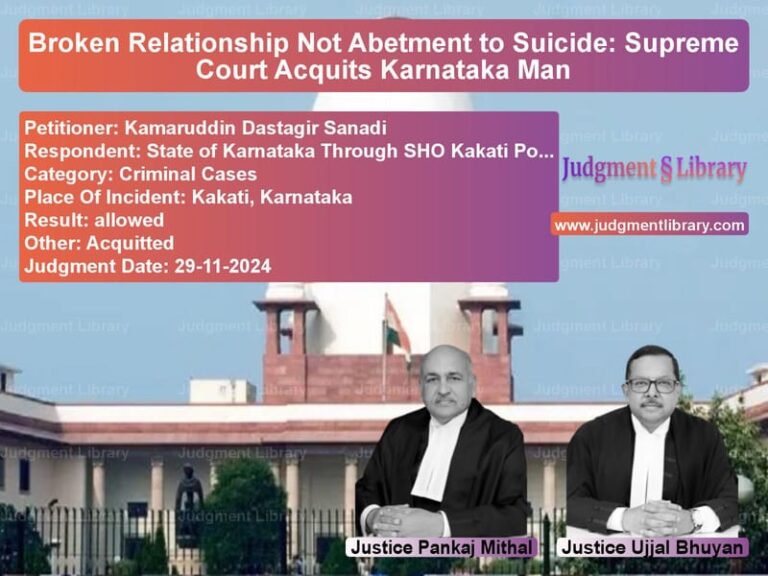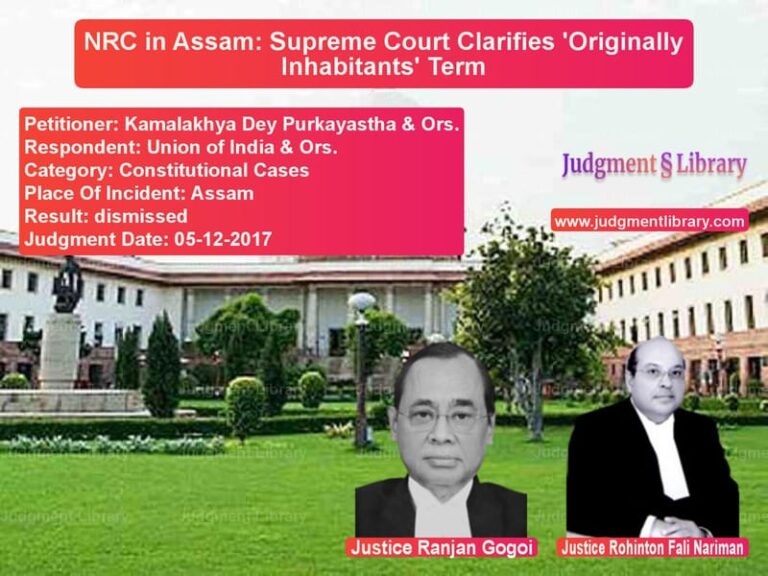Supreme Court Clarifies Counter-Claim Rules: No Claims Against Co-Defendants After Issues Framed
In a landmark judgment that clarifies crucial procedural aspects of civil litigation, the Supreme Court of India recently delivered a significant ruling on when and against whom counter-claims can be filed in civil suits. The case involved a complex property dispute that had been winding its way through the courts for over a decade, raising important questions about the interpretation of Order VIII Rule 6A of the Code of Civil Procedure.
The legal battle began in 2012 when Rajul Manoj Shah filed a suit in the City Civil Court, Ahmedabad, concerning a bungalow in a cooperative housing society near Stadium Char Rasta. The property originally belonged to her father and, upon his demise, was jointly owned by Rajul and her brother. After her brother’s death, the property came to be jointly owned by Rajul and her sister-in-law. The dispute arose when Rajul discovered that her sister-in-law had entered into an agreement to sell her undivided share of the property to Kiranbhai Shakrabhai Patel on October 21, 2011. Rajul filed the suit seeking a declaration that her sister-in-law had no right to transfer the property without her consent and to have the agreement to sell declared null and void.
The case took several twists and turns over the years. The original defendant no. 1 (the sister-in-law) passed away on October 12, 2013, during the pendency of the suit. After her death, there were multiple applications regarding her substitution in the case. Eventually, the High Court, through a consent order dated February 10, 2020, appointed the Nazir (court official) of the City Civil Court as defendant no. 1 to represent the interests of the deceased sister-in-law.
The crucial turning point came on July 26, 2021, when defendant no. 2, Kiranbhai Patel, filed an application seeking to amend his written statement and add a counter-claim. This counter-claim sought two main reliefs: first, to direct the Nazir to accept the remaining consideration and execute a sale deed for the undivided share based on the 2011 agreement to sell; and second, to partition the suit property under the Partition Act, 1893.
The Trial Court dismissed this application on August 5, 2021, holding that defendant no. 2 had filed the application after a considerable delay and that it amounted to an abuse of the process of court. The Trial Court noted that issues had been framed way back on February 12, 2019, and that allowing such a belated application would defeat the principle of speedy trial. More importantly, the Trial Court held that a counter-claim cannot be maintained against a co-defendant.
However, the High Court took a different view and allowed defendant no. 2’s petition. The High Court reasoned that the cause of action for defendant no. 2 arose only after the Nazir was appointed to represent defendant no. 1’s interests in February 2020, and since the application was filed soon thereafter, there was no delay. The High Court also held that the counter-claim was maintainable as it was filed against the Nazir (court official) and the original plaintiff, not just against a co-defendant.
Aggrieved by this decision, Rajul Manoj Shah approached the Supreme Court. The appellant’s counsel, Mr. Ritin Rai, made two straightforward submissions before the Supreme Court. First, he argued that a counter-claim cannot be entertained after issues have been formulated in the suit, relying on the decision in Ashok Kumar Kalra v. Wing CDR. Surendra Agnihotri. Second, he contended that a counter-claim cannot be made against a co-defendant, citing Rohit Singh & Ors. v. State of Bihar.
Read also: https://judgmentlibrary.com/supreme-court-upholds-property-rights-in-land-dispute-case/
On the other side, Mr. Pradhuman Gohil, representing respondent no. 1/defendant no. 2, argued innovatively about the interpretation of Order VIII Rule 6A of CPC and also relied on certain portions of the 27th Law Commission Report.
The Supreme Court, in its analysis, first examined the jurisdiction exercised by the High Court. The Court noted that the High Court’s reasoning did not indicate how any jurisdictional error had arisen for consideration. The Court then proceeded to examine the two main issues raised by the appellant.
Regarding the first issue of whether a counter-claim can be filed against a co-defendant, the Supreme Court provided a detailed analysis of Order VIII Rule 6A of CPC. The Court emphasized that Rule 6A(1) explicitly states that a defendant may set up a counter-claim against the claim of the plaintiff. The Court quoted its earlier decision in Rohit Singh v. State of Bihar, where it had held: Normally, a counterclaim, though based on a different cause of action than the one put in suit by the plaintiff could be made. But, it appears to us that a counterclaim has necessarily to be directed against the plaintiff in the suit, though incidentally or along with it, it may also claim relief against the co-defendants in the suit. But a counterclaim directed solely against the co-defendants cannot be maintained. By filing a counterclaim the litigation cannot be converted into some sort of an interpleader suit.
The Supreme Court observed that in the present case, defendant no. 2 sought to raise a counter-claim primarily for the relief of specific performance of the agreement dated October 21, 2011, executed in his favor by the deceased original defendant no. 1. This relief of specific performance as sought to be raised by defendant no. 2 cannot be set up by way of a counter-claim since the same is not directed against the appellant/plaintiff, but is instead directed solely against the co-defendant. The Court firmly stated that this position is no more res-integra (no longer open to discussion) in view of the decision in Rohit Singh.
The Court also rejected the argument that the counter-claim included a prayer for partition, noting that defendant no. 2 must first establish a right of claim over the property, which is absent till he succeeds against the estate of defendant no. 1, and only thereafter the question of setting up a counter-claim against the plaintiff may arise.
On the second issue regarding the timing of filing the counter-claim, the Supreme Court referred to its decision in Ashok Kumar Kalra v. Wing CDR Surendra Agnihotri, where it had clearly articulated the principles governing the time-frame for filing counter-claims. The Court quoted extensively from this precedent: The time limitation for filing of the counterclaim, is not explicitly provided by the legislature, rather only limitation as to the accrual of the cause of action is provided. Having said so, this does not mean that counterclaim can be filed at any time after filing of the written statement. The Court further emphasized: But however, we are of the considered opinion that the defendant cannot be permitted to file counterclaim after the issues are framed and after the suit has proceeded substantially. It would defeat the cause of justice and be detrimental to the principle of speedy justice as enshrined in the objects and reasons for the particular amendment to CPC.
The Supreme Court noted that in the present case, issues were framed on February 12, 2019, and the application for counter-claim was filed almost two years later on July 26, 2021. More significantly, defendant no. 2 was seeking specific performance of an agreement dated October 21, 2011, which provided for execution of the sale deed within twelve months. The defendant no. 2 did not take any action for years, only deciding to file the application after nine years of the filing of the suit and two years after the framing of issues.
The Court also made an important distinction between the nature of claims involved, noting that the enquiry and trial arising out of a claim to enforce an agreement to sell is qualitatively different from the claim of a plaintiff seeking a declaratory decree against a defendant.
In its concluding remarks, the Supreme Court held that the High Court committed an error in reversing the judgment of the Trial Court by permitting defendant no. 2 to file a counter-claim against defendant no. 1 and not against the plaintiff. The Court allowed the appeal and set aside the order and judgment passed by the High Court, thereby restoring the Trial Court’s decision that had rejected the application for counter-claim.
This judgment serves as an important precedent clarifying several key aspects of civil procedure. It reaffirms that counter-claims must primarily be directed against the plaintiff, not co-defendants. It also establishes that while there’s no explicit time limit for filing counter-claims in the CPC, courts cannot permit them after issues have been framed and the suit has proceeded substantially, as this would defeat the principle of speedy justice. The decision balances the right of defendants to raise counter-claims with the need for efficient and timely resolution of disputes, ensuring that procedural provisions are not misused to delay litigation unnecessarily.
Petitioner Name: Rajul Manoj Shah alias Rajeshwari Rasiklal Sheth.Respondent Name: Kiranbhai Shakrabhai Patel & Anr..Judgment By: Justice Pamidighantam Sri Narasimha, Justice Joymalya Bagchi.Place Of Incident: Ahmedabad, Gujarat.Judgment Date: 12-09-2025.Result: allowed.
Don’t miss out on the full details! Download the complete judgment in PDF format below and gain valuable insights instantly!
Download Judgment: rajul-manoj-shah-ali-vs-kiranbhai-shakrabhai-supreme-court-of-india-judgment-dated-12-09-2025.pdf
Directly Download Judgment: Directly download this Judgment
See all petitions in Property Disputes
See all petitions in Specific Performance
See all petitions in Contract Disputes
See all petitions in Judgment by P.S. Narasimha
See all petitions in Judgment by Joymalya Bagchi
See all petitions in allowed
See all petitions in Quashed
See all petitions in supreme court of India judgments September 2025
See all petitions in 2025 judgments
See all posts in Civil Cases Category
See all allowed petitions in Civil Cases Category
See all Dismissed petitions in Civil Cases Category
See all partially allowed petitions in Civil Cases Category

